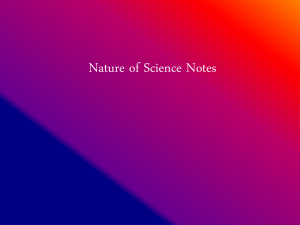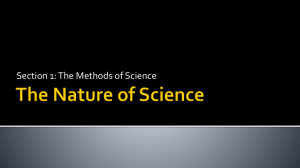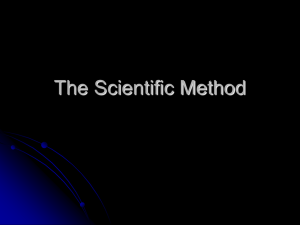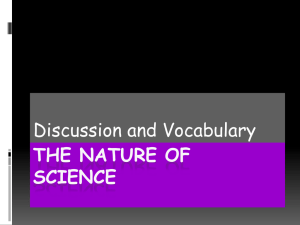SECTION 3: SCIENTIFIC PROCESSES Chapter 1: Biology and You
advertisement
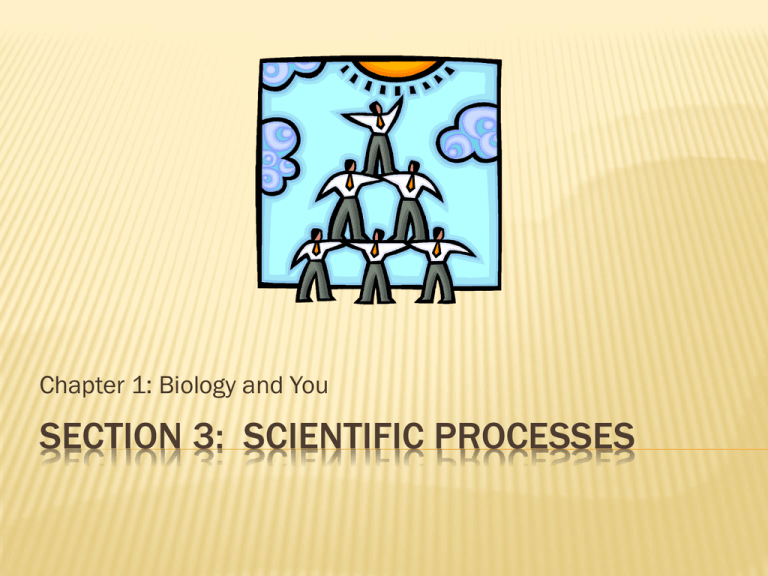
Chapter 1: Biology and You SECTION 3: SCIENTIFIC PROCESSES OBJECTIVES Describe the stages common to scientific investigations. Distinguish between forming a hypothesis and a theory. OBSERVATION: THE BASIS OF SCIENTIFIC RESEARCH Observation is the act of noting or perceiving objects or events using the senses. OBSERVATION: THE BASIS OF SCIENTIFIC RESEARCH All scientists have a certain way of investigating the world. Scientific investigations begin with observations. Observations cause scientists to ask questions about their observations STAGES OF SCIENTIFIC INVESTIGATIONS Scientific investigations tend to have common stages. These stages are called the Scientific Method. There is more than one way to conduct an investigation. Scientific Methods or Scientific Processes are more accurate terms for the stages of scientific investigation. REAL LIFE EXAMPLES OF SCIENTIFIC METHOD THAT INVOLVES STAGES OF SCIENTIFIC INVESTIGATIONS Scientific Processes include the following steps: 1. 2. 3. 4. 5. Collecting observations. Asking questions Forming hypothesis Confirming predictions (with experiments when needed) Drawing conclusions STAGES OF SCIENTIFIC INVESTIGATIONS Hypothesis – an explanation that might be true, a statement that can be tested by additional observations or experimentation. Educated Guess Prediction – the expected outcome of a test, assuming the hypothesis is correct STAGES OF SCIENTIFIC INVESTIGATIONS Experiment – a planned procedure to test a hypothesis. WITHIN THE EXPERIMENT Control group – a group in an experiment that receives no experimental treatment. The control group is necessary for comparing the results of the experiment. WITHIN THE EXPERIMENT Independent variable - the factor that is changed in an experiment. Dependent variable – the variable that is measured in an experiment, the outcome of the dependent variable depends on what is done to the independent variable. DRAWING CONCLUSIONS Once data is collected and analyzed, a conclusion is made as to whether the data supports the hypothesis. VIEWING CONCLUSIONS IN CONTEXT There is often more than one possible reason for a result. All the factors that may affect an outcome must be considered. SCIENTIFIC EXPLANATIONS Constructing a Theory What is a theory? Theory – a set of related hypotheses that have been tested and confirmed many times by many scientists. CONSTRUCTING A THEORY A theory unites and explains a broad range of observations. The word theory is used by the general public to mean a guess, or lack of certainty. In science, a theory is a well-supported scientific explanation that makes useful predictions. SCIENTISTS REPORT THEIR RESULTS Scientific reports are reviewed by other scientists. Scientific reports allow other scientists to use the information obtained in an experiment. Scientific reports also allow other scientists to repeat and test experiments.
